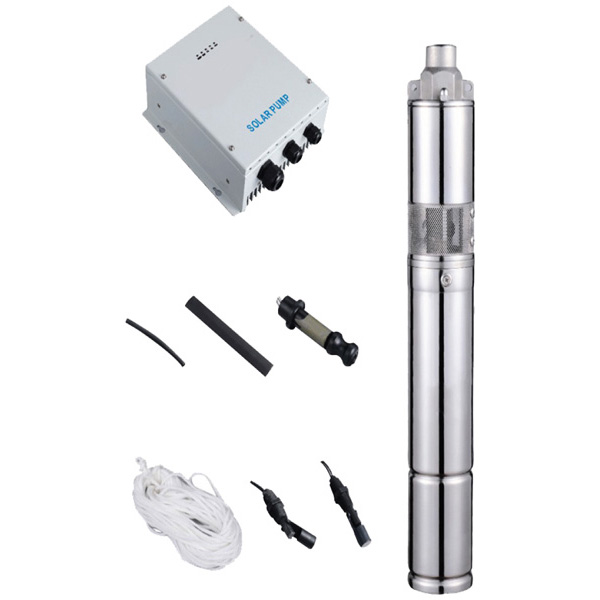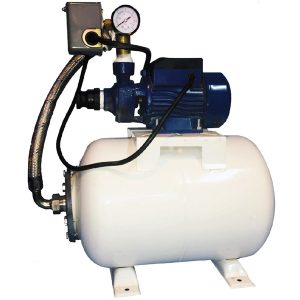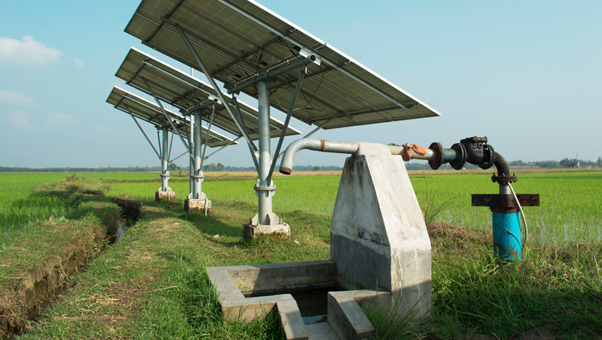If you’re looking for reliable water access, solar water pumps are an increasingly popular choice.
An abundance of available sunlight makes solar-powered water pumping a reliable solution that also cuts down on electricity costs.
A good alternative to a full solar pump system is the option to connect a variable speed drive pump to an existing solar system. We can recommend alternative pumps that will be compatible with your existing solar set-up.
Let’s take a look at:
- What a solar pump system consists of
- Solar water pump prices
- Water pumps compatible with existing solar systems
- The basics of connecting / installing solar water pumps
- What to consider in the South African context
What are solar water pumps?
It’s quite simple. Solar water pumps use energy captured from the sun via photovoltaic (PV) panels to power a pump.
This system typically consists of:
- Solar Panels: Convert sunlight directly into direct current (DC) electricity.
- Inverter: An inverter will convert the DC electricity to alternating current (AC) electricity, which is used to power the pump.
- The Pump: This can be either a submersible pump (placed down a borehole or well) or a surface pump (located near the water source, like a tank or dam).
- Solar Pump Controller: Connects the water pump and solar panels. Monitors and controls the pump, on/off, optimizes and provides protection for the pump motor (e.g., against dry running or overload). Often includes features like Maximum Power Point Tracking (MPPT) to optimize power output in varying light conditions.
- Pipes: Transport the water from the source, to where it needs to go, such as a tank.
Answering your key questions
We get asked a lot about the practicalities. Let’s tackle some common queries:
1. How much is a solar water pump? (solar water pump price)
This is a very common question.
To give you a rough idea, prices for a basic solar borehole pump vary between about R8 000 and R19 000, a small solar inverter costs around R8 700 – R9 500, with the solar panels costing R 6 000 – R 7 000.
A larger solar pump setup varies, based on several factors:
- Pump Type & Size: Borehole pumps differ in price from surface booster pumps.
- Flow Rate Needed: How much water do you need per hour/day?
- Head/Lift: How high or far does the water need to be pumped? (Especially crucial for boreholes).
- Solar Panel Requirements: More power needed means more panels.
- Controller Type: Different features and capacities exist.
- Brand & Quality: Reputable brands often mean better longevity and support.
- Installation Costs: Don’t forget to factor this in (more on that below).
If your water source is remote or far from your electricity supply, a solar pump is a good option.
Get pricing for solar pumps in South Africa
Because every setup is unique, the best approach is to get a tailored quote.
Contact AfriPumps here, and our experts can assess your specific needs and provide an accurate solar water pump price.
Or, if you know what you need, or just need a spare part, you can get prices for solar water pumps online here.
2. A second option: get a water pump that’s compatible with your existing solar system
People that have an existing solar system often need a pump for a water back-up system.
At AfriPumps, we recommend that people that have an existing solar system can opt for a compatible variable speed drive pump.
If you’re looking for a solar pump for back-up JoJo tanks, this is also a good option.
You can ask us to recommend a water pump that will be compatible with your existing solar system – contact us here.
3. How to connect a solar water pump? & How to install a solar water pump?
Wondering how to connect a solar water pump or tackle the full installation?
- Connection Basics:
In simple terms, the connection sequence is:
Solar Panels -> Solar Pump Controller -> Pump.
Wiring needs to be correctly sized and safely connected according to specifications. - Installation Process:
This involves:
– Physically placing the pump (in the borehole, next to the tank, etc.)
– Mounting the solar panels securely (usually facing North in South Africa for maximum sun exposure)
– Connecting the wiring
– Setting up any necessary plumbing
Our Recommendation:
Due to the involvement of DC electricity (which has specific safety considerations), water plumbing, potential warranty conditions tied to installation, and the need to ensure component protection and system efficiency, professional installation by technicians experienced in solar pumping systems is generally advisable.
This is particularly relevant for solar borehole pumps where specialized equipment may be needed for pump setting.
We suggest using a recommended plumber or engineer, or using our water pump installation service.
To get pricing for a water pump installation – contact us here.

Explore Different Types: Finding Your Fit
Solar water pumps aren’t one-size-fits-all. The best type for you depends entirely on your needs:
Solar Borehole Pumps South Africa:
Accessing groundwater is essential for many farms and homes that aren’t connected to municipal lines.
Our range of solar borehole pumps is specifically designed to efficiently lift water from deep underground, providing a water source independent of the grid for farms, homes, and communities.
System design considers borehole depth, water yield, and daily water volume needed.
See prices for solar borehole pumps here.
Solar Booster Pumps:
Experiencing low water pressure? Whether from a tank or a municipal feed, a solar booster pump South Africa can significantly increase water pressure throughout your property, ensuring strong flow for taps, showers, and irrigation, all powered sustainably.
Boosting Pressure for Geysers (using Solar Booster Pumps):
To increase water pressure feeding into a hot water geyser system, a solar booster pump (as described above) may be used as part of the overall plumbing system.
It’s important to differentiate these from small circulation pumps sometimes found within solar water heating systems (related to heat transfer fluid) – these might sometimes be referred to as a solar geyser pressure pump but are not actually pressure pumps.
Solar Water Pumps for JoJo Tanks:
Moving water from storage tanks, such as JoJo tanks commonly used for rainwater harvesting or backup supply, is another typical use.
A solar water pump for JoJo tank setups can transfer water for irrigation, livestock watering, or household supply during daylight hours.
Contact us for pricing on back-up water tank and pump solutions

5 benefits of choosing solar water pumps in South Africa
- Be Independent of the Grid: Operate without reliance on Eskom or municipal electricity, mitigating the impact of load shedding on water availability.
- Use Solar as a Resource: Leverage South Africa’s high levels of solar irradiation.
- Reduce Operating Costs: Eliminate or significantly reduce electricity costs associated with running the pump compared to conventional electric pumps.
- Environmentally Friendly: Reduce your carbon footprint with clean energy.
- Reach Remote Locations: Provide water in areas far from grid connections.
Ready to Make the Switch?
Investing in solar water pumps is a smart, cost-effective decision for managing your water needs in South Africa.
Whether you need to draw from a borehole, boost pressure, or use water stored in tanks, we can recommend an efficient water pump.
Our team will answer your questions and help you find the right water pump.


